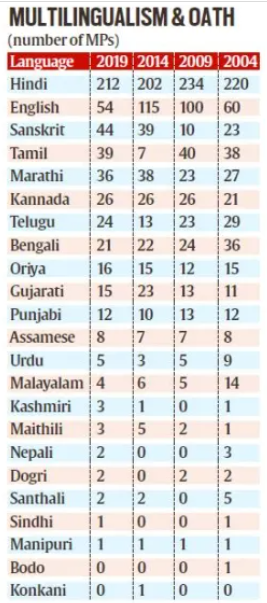The 18th Lok Sabha's first session started recently and the newly elected members took their oath as MPs, as required by the Constitution, before the House begins its legislative work.
The Third Schedule of the Indian Constitution outlines the forms of oaths and affirmations for various constitutional positions, including the President, Ministers, Judges, and Members of Parliament and State Legislatures.
|
Tenure of Member of Parliament |
|

|
Oath |
Affirmation |
|
MP swore in the name of God.
|
MP affirm their allegiance to the constitution. |
|
In 17th Lok Sabha, 87% of MPs swore an oath. |
In 17th Lok Sabha, 13% of MPs affirmed their allegiance to the Constitution. |
The Indian Express| Proceedings of Parliamentary Oath